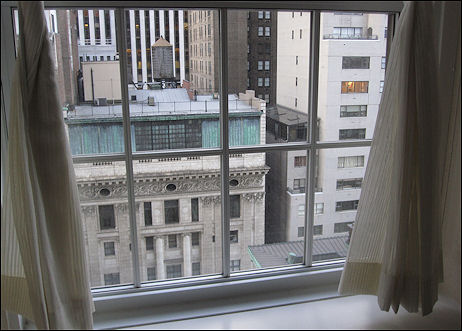
Sunday, 11.28, 8:25 am.
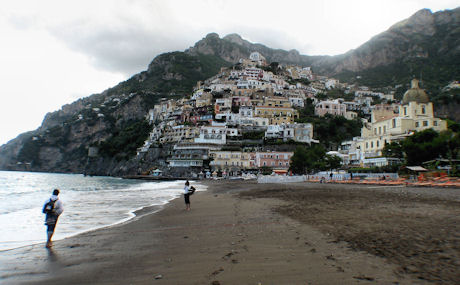
Without the slightest doubt the single most soothing image I have in my entire photo library. Positano has been overtaken and polluted by schmuck tourists, but I’d go back there again in a second. Taken in late May 2007.


One of my many derelictions right now is not having seen John Lee Hancock‘s The Blind Side, which I’m planning to catch tomorrow. It’s a much bigger hit than box-office pundits were expecting, of course. “A 47% uptick from its opening day B.O. with $16.2 million on 3,140 runs…pic’s domestic cume stands at $76.3 million,” Variety reports.
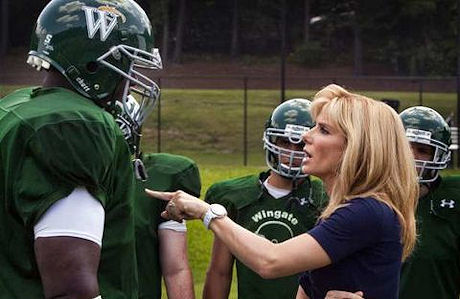
The basic appeal, I’m guessing, is that it’s a good Middle American movie that’s not informed by the neurotic mentalities of the coasts. I heard this morning that a rival distributor (i.e., not a Warner Bros. guy) recently projected to a friend that it will ultimately make north of $200 million. It’s the only film besides Up to have a CinemaScore A-plus so far. Old news, chasing the tail, etc.
“Bright vivid technicolor…like Spielberg directed it…a serial-killer movie meets The Color Purple…Silence of the Lambs meets What Dreams May Come.” — a friend who caught a screening last night in Los Angeles.
A couple of hours hence I’ll be heading over to BAM’s Harvey Theatre and a matinee performance of the Sydney Theatre Company’s A Streetcar Named Desire, which began yesterday and runs only through 12.20. The lure, of course, is a reputedly devastating Cate Blanchett as Blanche Dubois. The classic Tennessee Williams play was directed by Liv Ullman, and costars Joel Edgerton as Stanley Kowalski and Robin McLeavy as Stanley’s wife and Blanche’s sister, Stella.
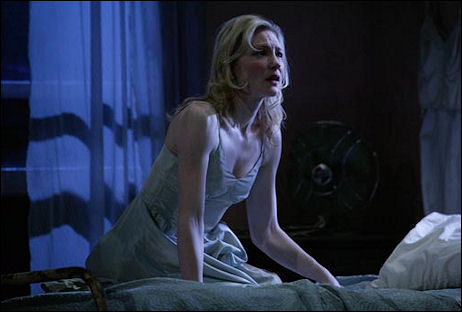
“If Blanchett’s nerve-shattering turn doesn’t knock the wind out of you, then there is nothing on a stage that can blow you away,” wrote Washington Post critic Peter Marks on 11.2. “What Blanchett achieves…amounts to a truly great portrayal — certainly the most heartbreaking Blanche I’ve ever experienced.”
I know the Streetcar dialogue so well I’ll be able to mouth a good part of it along with the actors. Like Winston Churchill mouthing Hamlet from the front row as he watched Richard Burton perform it on the London stage in the ’50s.
The run is totally sold out, of course. Impossible to get tickets except through fiendish scalpers. 190 minutes with intermission, or something like 170 or 175 minutes without. Elia Kazan‘s 1951 film ran 122 minutes, or roughly 50 minutes shorter.
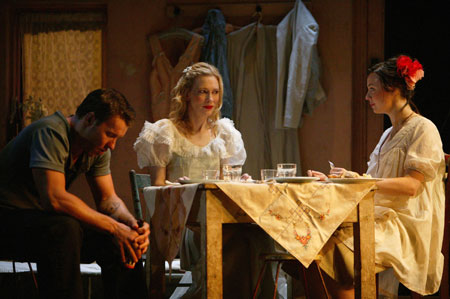
I had a half-hour chat last Tuesday evening with Me and Orson Welles star Christian McKay, and despite enjoying our time and really liking the guy — he’s spirited and razor-sharp and full of buoyancy — I waited five days to post. I don’t know why and I’m sorry. It doesn’t indicate anything. I just fell into a lazy pocket.
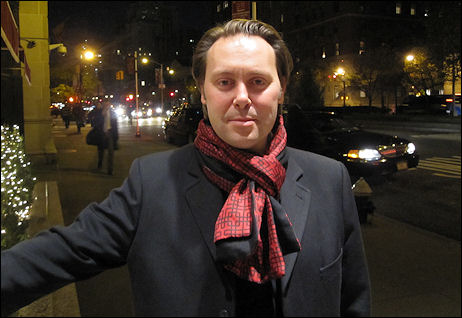
Actually, that’s not true. I was reluctant to get into a McKay thing because as gifted as he seems to be — he’s actually brilliant in MAOW — he’s in his mid 30s now and only just starting to happen, and I knew I’d have to answer what he’s been doing all this time and why he wasn’t on the stick in his early 20s. The answer, he says, is that he was into music when he was younger. The other answer, I suspect, is that, like myself, he was simply a late bloomer.
Whatever — the guy is a British dynamo with one of those “God, I love acting!…I mean, I love being paid attention to!” personalities. He looks like Orson Welles, of course, but he’s obviously himself as well, and after sitting with him for 20 or so minutes and then talking a bit more under a hotel awning out on Park Avenue it seemed obvious that he’s really and truly got it. Which means some combination of heat, hunger, talent, ambition, chutzpah and whatever else. Oh, and McKay smokes cigarettes. And he’s had a battle or two with the bathroom scale.
As I wrote a few days ago, Me and Orson Welles “is absolutely worth seeing for Christian McKay’s thunderbolt performance as the 22 year-old Welles — a headstrong genius in his hormonal-visionary cups. Vincent Donofrio was a fine Welles in Ed Wood (although someone else voiced the dialogue) and Liev Schreiber delivered a reasonably full-bodied Welles in RKO 281, but McKay — 34 or 35 when the film was shot, and looking like he could be 28 or 29 — is the Fo. He’s the standard-bearer and the king of the hill, the guy to beat the next time somebody plays Welles.”
And N.Y. Times critic A.O. Scott wrote that the film contains “the ego and the brilliance [of Orson Welles]..in full blossom. They are captured, with a brio and wit that puts most biopic mummery to shame, by Christian McKay, a British actor with a slender resume and superhuman confidence. His evident relish in the dimensions of this role is a crucial part of the performance. It’s so much fun to play Orson Welles because it must have been at least as much fun to be Orson Welles.”
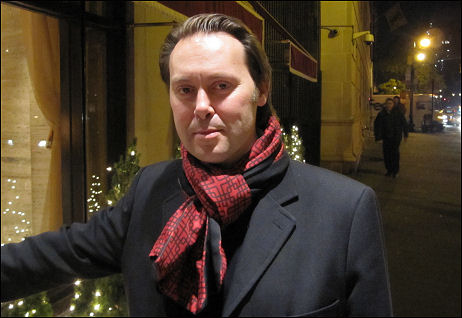
Since MAOW McKay has performed a small part in Woody Allen‘s next film (i.e., the one shot last summer in London) and a character named Hamilton McMillan in Bernard Rose‘s Mr. Nice.
He was on his way to do a Charlie Rose taping (along with director Richard Linklater and costars Zac Efron and Claire Danes) following our chat, but I’ve searched and searched and can’t find the segment on the Rose site or anywhere else. It doesn’t exist! I also asked the publicist when it’ll air…zip.